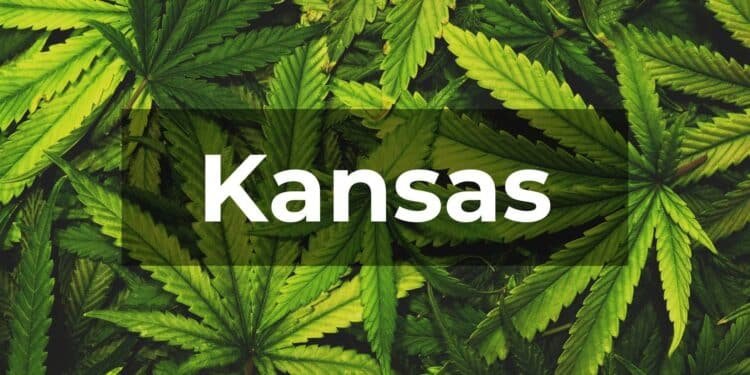Welcome to our comprehensive guide on the current marijuana laws in Kansas. Many people often wonder whether marijuana is legal in this state, especially with many other states legalizing it for both medicinal and recreational purposes.
As of now, marijuana is still illegal for all purposes in Kansas. This means that possession, use, and distribution of marijuana can have serious legal consequences. In this article, we will explore the various laws and regulations that have been put in place to control marijuana use in Kansas, as well as the penalties for breaking these laws.
Understanding Kansas Marijuana Legislation
While marijuana remains illegal under federal law, individual states have been increasingly passing their own legislation legalizing the substance. Kansas, however, is not one of the states that has done so.
In Kansas, possession, sale, and distribution of marijuana are all illegal. Possession of marijuana, even in small amounts, can result in misdemeanor charges and fines. If an individual is found to have a larger amount of marijuana, or if they are suspected of intending to distribute it, they can be charged with a felony and face more severe penalties.
The state of Kansas does not currently allow for the medical use of marijuana, nor does it have any legal recreational use. However, there have been discussions and proposed legislation surrounding the legalization of medical marijuana in the state, though nothing has yet come to fruition.
Understanding Kansas Marijuana Legislation
There are several statutes that govern the possession, sale, and distribution of marijuana in Kansas. One such statute is K.S.A. 65-4105, which classifies marijuana as a Schedule I controlled substance under state law. Schedule I substances are those that have been deemed to have a high potential for abuse and no currently accepted medical use.
Under K.S.A. 65-4107, it is illegal to possess or distribute marijuana in any form, including synthetic cannabinoids, with only limited exceptions for research purposes. While first-time possession offenses are classified as misdemeanors, in most cases, possession of marijuana in Kansas is considered a felony.
Additionally, K.S.A. 65-4120 sets forth the penalties for marijuana possession and distribution. If an individual is found to be in possession of less than 25 grams of marijuana, they can be charged with a Class B misdemeanor and face up to six months in jail and a $1,000 fine. Possession of more than 25 grams, or any evidence of intent to distribute, can result in a felony conviction with much steeper penalties.
| Marijuana Possession Penalties in Kansas | Penalty |
|---|---|
| Less than 25 grams of marijuana | Class B misdemeanor |
| More than 25 grams of marijuana or evidence of intent to distribute | Felony |
It is important to note that while marijuana remains illegal under Kansas law, several other states have legalized the substance for medical or recreational purposes. This has led to confusion and concern for some individuals who may be traveling across state lines with marijuana in their possession.
If you are facing marijuana-related charges in Kansas, it is highly recommended that you seek legal representation to help navigate the complex laws surrounding marijuana possession and distribution in the state.
Kansas Marijuana Possession Laws
It is a crime to possess any amount of marijuana in Kansas, and the penalties for possession can be severe. The exact penalties for possession depend on the amount of marijuana in question and whether the offense is a first-time offense or a subsequent offense.
| Amount of Marijuana Possessed | Penalty for First-Time Offense | Penalty for Subsequent Offenses |
|---|---|---|
| Less than 25 grams | Misdemeanor, up to 1 year in jail and a fine up to $1,000 | Felony, 10-42 months in prison and a fine up to $100,000 |
| 25 grams to 450 grams | Felony, 10-42 months in prison and a fine up to $100,000 | Felony, 14-51 months in prison and a fine up to $300,000 |
| 450 grams or more | Felony, 10-42 months in prison and a fine up to $100,000 | Felony, 14-51 months in prison and a fine up to $500,000 |
In addition to criminal penalties, individuals convicted of marijuana possession in Kansas may face other consequences, such as loss of driving privileges and difficulty obtaining employment.
Medical Marijuana Exception
It is important to note that while possession of marijuana is illegal in Kansas, there is an exception for individuals who possess cannabidiol (CBD) oil with a THC content of no more than 5%. This exception applies only to individuals with debilitating medical conditions who have received a recommendation from a doctor to use CBD oil as a treatment.
Medical Marijuana in Kansas
As of September 2021, medical marijuana is still not legal in Kansas. However, there have been recent efforts in the state to pass legislation that would legalize medical marijuana for qualified patients.
House Bill 2184, which was introduced in February 2021, would allow patients with qualifying medical conditions to obtain medical marijuana with a doctor’s recommendation. The bill would also establish a regulatory framework for the cultivation, processing, and distribution of medical marijuana in the state.
Despite these efforts, the bill has not yet been passed into law. Supporters of medical marijuana legalization in Kansas continue to advocate for its benefits, citing research that shows it can help alleviate symptoms for a variety of medical conditions, including chronic pain and nausea related to chemotherapy.
How to Become a Medical Marijuana Patient in Kansas
- As of now, there is no legal way to become a medical marijuana patient in Kansas.
- If House Bill 2184 is passed into law, patients with qualifying medical conditions would need to obtain a recommendation from a licensed physician in order to obtain medical marijuana.
- Once the recommendation is obtained, patients would need to apply for a medical marijuana card to legally purchase and use medical marijuana in the state.
Recreational Marijuana in Kansas
Currently, recreational marijuana is illegal in Kansas. Possession of any amount of marijuana for non-medical purposes is a criminal offense, and penalties can include fines and imprisonment. However, there have been efforts to legalize recreational marijuana in the state.
Efforts to Legalize Recreational Marijuana
In recent years, there have been several attempts to legalize recreational marijuana in Kansas through legislative action. However, these efforts have not gained much traction and have not yet been successful. It is uncertain when or if recreational marijuana will become legal in Kansas.
Potential Benefits and Drawbacks
There are potential benefits and drawbacks to legalizing recreational marijuana in Kansas. On one hand, legalization could generate additional tax revenue for the state and reduce the number of marijuana-related arrests and prosecutions. It could also create new jobs and stimulate economic growth. On the other hand, opponents of legalization argue that it could lead to increased use of drugs and impaired driving, among other issues.
Regardless of the outcome, it is important to be aware of the current laws and regulations pertaining to marijuana use in Kansas. This includes understanding the penalties for possessing, cultivating, and distributing marijuana, as well as the requirements for becoming a medical marijuana patient or operating a dispensary or cultivation facility.
Marijuana and DUI Laws in Kansas
Driving under the influence of marijuana is a serious offense in Kansas. It is illegal to operate a motor vehicle while under the influence of any drug, including marijuana.
If you are stopped by law enforcement and suspected of driving under the influence of marijuana, you may be asked to perform field sobriety tests. These tests are designed to measure your level of impairment and determine if you should be arrested for DUI.
If you are arrested for DUI, you may be subject to fines, jail time, and license suspension. First-time offenders face a fine of up to $1,000 and up to six months in jail. Repeat offenders face even steeper penalties.
In addition to criminal penalties, you may also face civil penalties, such as license suspension and the installation of an ignition interlock device in your vehicle.
If you are using marijuana for medical purposes, it is important to note that this does not exempt you from DUI laws in Kansas. It is still illegal to operate a motor vehicle while under the influence of marijuana, even if you have a valid medical marijuana card.
It is important to remember that driving under the influence of marijuana is not only illegal, but also dangerous. If you plan to use marijuana, make sure to wait until you are no longer impaired before operating a vehicle. It is always better to be safe than sorry.
Kansas Marijuana Arrests and Prosecutions
Despite the strict marijuana laws in Kansas, the number of arrests and prosecutions for marijuana-related offenses have been steadily increasing. In 2019 alone, there were over 2,600 arrests made for marijuana-related offenses in the state.
These arrests not only impact the individuals directly involved but also put a strain on the state’s criminal justice system. Prosecuting these cases takes time and resources away from other important cases and can lead to overcrowding in jails and prisons.
“It’s a waste of time and money to be putting people in jail for something that is legal in other states,” said state representative, John Wilson.
There have been efforts to re-evaluate the state’s marijuana laws and reduce the number of arrests and prosecutions. In 2018, the Wichita City Council passed an ordinance that would give police officers the option to issue a citation with a fine for individuals caught with small amounts of marijuana instead of making an arrest.
There is also growing public support for legalizing marijuana in some form in the state. A 2020 survey found that over 60% of Kansas residents support legalizing medical marijuana, while around 46% support legalizing recreational marijuana.
As attitudes towards marijuana change and more states legalize its use, it will be interesting to see how Kansas adapts its laws and policies surrounding the drug.
Marijuana and the Kansas Economy
While marijuana legalization is often debated in terms of its impact on public health and criminal justice, it’s also important to consider its potential economic effects. Several states that have legalized marijuana have seen significant increases in tax revenues and job growth.
However, marijuana legalization remains a controversial issue in Kansas, and any effort to legalize it would face significant political hurdles. As of now, marijuana remains illegal for both medical and recreational use in the state.
Opponents of legalization argue that it would lead to increased drug addiction rates, higher crime rates, and negative societal impacts. Proponents, on the other hand, argue that legalization could generate much-needed tax revenues and create new job opportunities.
It’s worth noting that even if marijuana were to become legal in Kansas, it would likely take several years to establish a regulatory framework and licensing system for dispensaries and cultivation facilities.
Frequently Asked Questions About Marijuana in Kansas
As Kansas continues to navigate its marijuana laws, many questions have been raised about what is and isn’t legal. Here are some frequently asked questions:
Is marijuana legal in Kansas?
No, marijuana is not legal for either medical or recreational use in Kansas. Possession, cultivation, and distribution of marijuana are all illegal and subject to penalties.
What are the penalties for marijuana possession in Kansas?
The penalties for marijuana possession in Kansas vary based on the amount and number of offenses. Possession of less than 25 grams is a misdemeanor offense with a $1,000 fine and up to 1 year in jail. Possession of more than 25 grams is a felony offense with a $100,000 fine and up to 3.5 years in prison.
Can I get a medical marijuana card in Kansas?
No, medical marijuana is not currently legal in Kansas. However, there have been efforts to pass legislation to legalize it.
Will recreational marijuana become legal in Kansas?
There are currently no initiatives to legalize recreational marijuana in Kansas. However, as more states legalize it, there may be a push for Kansas to follow suit.
What is the legal age for marijuana use in Kansas?
There is no legal age for marijuana use in Kansas, as it is illegal for all ages.
Can I travel to another state where marijuana is legal and bring it back to Kansas?
No, it is illegal to transport marijuana across state lines, regardless of whether it is legal in the destination state. Doing so could result in federal charges.
What should I do if I am arrested for marijuana possession?
If you are arrested for marijuana possession, it is important to consult with a criminal defense attorney as soon as possible. An attorney can help you understand your rights and defend you in court.















